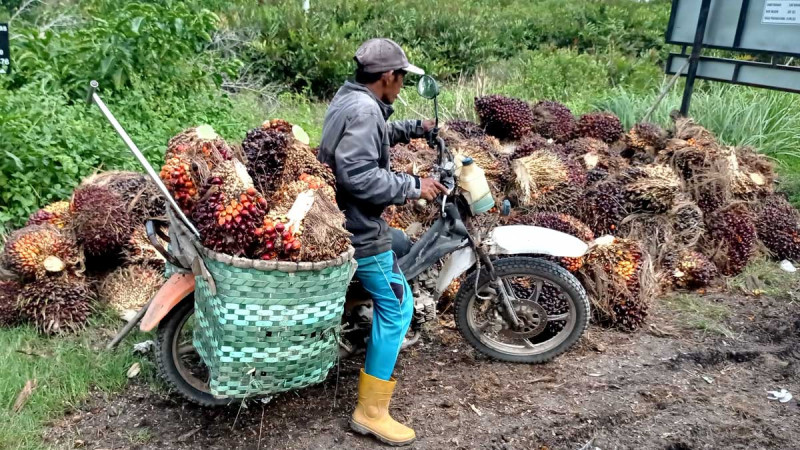
InfoSAWIT, JAKARTA — The Constitutional Court (MK) held a Plenary Session for the Judicial Review of Law Number 6 of 2023 on the Enactment of Government Regulation in Lieu of Law Number 2 of 2022 on Job Creation into Law (Job Creation Law), with the agenda of listening to statements from the President and the House of Representatives (DPR).
However, in the hearing, the government side conveyed to the Panel of Judges that they are not yet ready to provide the President's statement. Meanwhile, the DPR's statement was read by its Legal Counsel, member of Commission III DPR, Nasir Jamil.
This judicial review petition was filed by several civil society organizations, including the Indonesian Human Rights Committee for Social Justice (IHCS), Consortium for Agrarian Reform (KPA), Indonesia for Global Justice (IGJ), and Indonesian Farmers Union (SPI). They argue that several articles in the Job Creation Law revive norms that were previously declared unconstitutional by the MK.
Gunawan, IHCS representative, explained that this petition highlights changes to several laws such as the Coastal and Small Islands Management Law, Plantation Law, Horticulture Law, Forestry Law, and Water Resources Law. In addition, there are new regulations regarding the Land Bank which are considered not to make agrarian reform the basis for land provision.
“The Job Creation Law has changed and formed new norms that provide different interpretations of rules previously declared unconstitutional by the MK,” said Gunawan in an official statement received by InfoSAWIT, Friday (7/11/2025).
Meanwhile, Dewi Kartika from KPA argues that the regulations in the Job Creation Law actually violate the constitutionality of farmers, indigenous communities, and fishermen regarding agrarian resources. “This law hinders agrarian reform implementation, worsens land ownership inequality, and triggers agrarian conflicts in various regions,” she emphasized.
Dewi also reminded that the potential for criminalizing the people is increasing due to the ease of land acquisition for large investments and foreign capital placement. “This law introduces a new right in the form of Management Rights (HPL) as a source of land for the Land Bank. This has the potential to revoke people's rights to land and their fishing areas,” she added.
From an economic perspective, Rahmat Maulana Sidik from IGJ argues that the business ease facilitated by the Job Creation Law is actually more oriented towards global economic agenda. “The Job Creation Law, made through emergency mechanisms, is still unable to withstand the impact of the global economic crisis and the wave of layoffs that occurred,” he said.
In line with that, Agus Ruli Ardiansah from SPI highlighted changes in the Food Law, Farmers Protection Law, Sustainable Agricultural Cultivation System Law, and Sustainable Food Agricultural Land Protection Law. According to him, these changes prioritize food imports and give privileges to National Strategic Projects (PSN) to convert agricultural land.
“This Job Creation Law elevates the position of food and agricultural commodity imports, while food agricultural land is increasingly threatened to be converted for large projects,” said Agus Ruli.
The petitioners' legal counsel, Ahmad Laduni, stated that they will present two experts and two witnesses in the next hearing. The MK scheduled the next hearing on 17 November 2025, with the agenda of listening to the President's statement that was postponed. (T2)












